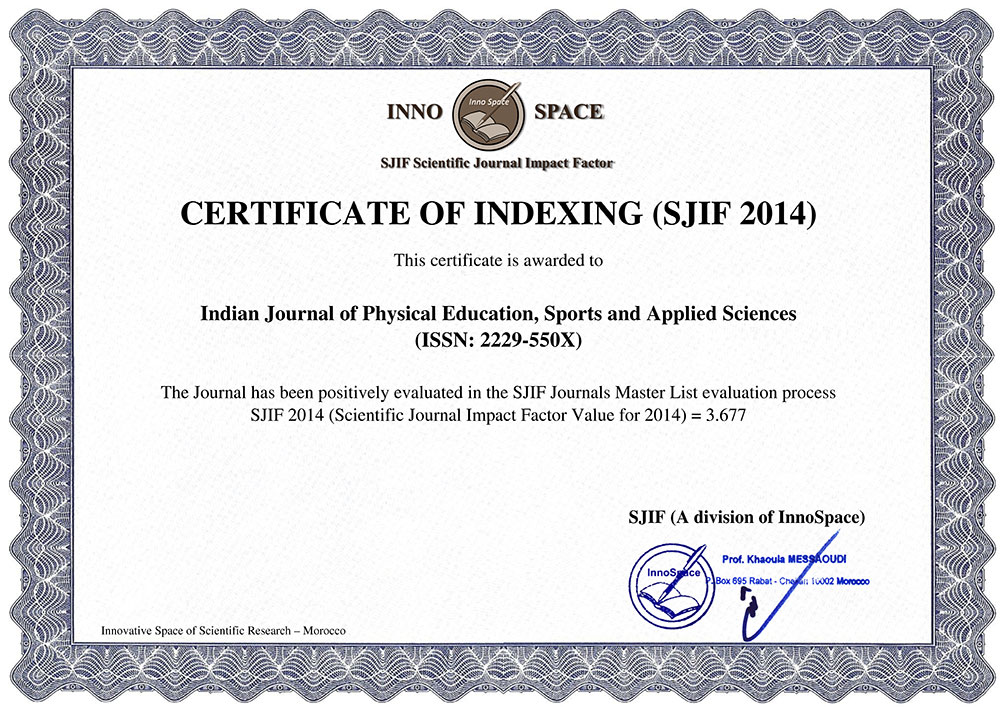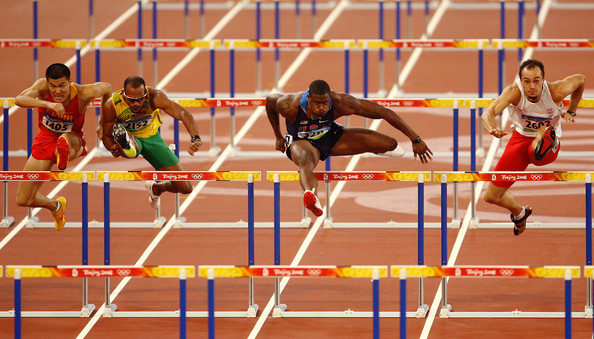ASSESSMENT OF HEALTH RELATED PHYSICAL FITNESS AMONG MIGRATED BOYS STUDENTS FROM NAXAL AFFECTED REGION
2020, January, Volume 10-Number 1 May 11, 2020| Author name : | Suresh Singh Pawar Dr. Jai Shankar Yadav | ||||
|---|---|---|---|---|---|
| Page no : | 15-20 | Volume : | 10 | Issue : | 1 |
doi no.: 05-2016-44975451, DOI Link :: http://doi-ds.org/doilink/07.2020-75891717/
Suresh Singh Pawar1 Dr. Jai Shankar Yadav2
Affiliations:
1 Ph. D Scholar, Department of Physical Education, Dr. C. V. Raman University, Kota Road, Kota Bilaspur (Chhattisgarh)
2 Associate Professor, Department of Physical Education, Dr. C. V. Raman University, Kota Road, Kota Bilaspur (Chhattisgarh)
ABSTRACT
The purpose of the study was to assess the Health-related Physical fitness for migrated school boys students of naxal affected regions of Chhattisgarh. A total of One hundred migrated students ranging ages between 14 to 18 years from naxal affected regions of Chhattisgarh, were randomly selected for the present investigation. To collect data on cardiovascular endurance, strength and strength endurance of abdominal muscles, flexibility of back and hamstring muscles and amount of body fat, selected subjects were tested on four health-related physical fitness test items i.e. modified bent/knee sit-ups for one minute, 1.5 mile run/walks test, sit and reach test and triceps and sub-scapular skin folds respectively. To assess the four components of health related physical fitness of Migrated boys and girls students from naxal affected region of Chhattisgarh ranging fourteen to eighteen years of age, F-ratio was computed. The results of study revealed that Significant differences existed among among the different age groups of boys students on of health related physical fitness components except modified sit-up component of physical fitness. Cardiovascular endurance of male migrated students were found improved significantly in age of seventeen years only. Flexibility of back and hamstring muscles of male migrated students improved significantly in age of sixteen years and decline with age up to age of eighteen years . The amount of accumulated fat increased more in age of seventeen years, and incline with age up to age of eighteen years .
Key Words: Health , Physical Fitness, School Students, Naxal area, Migrated Boys.
DOWNLOAD FULL TEXT: 
BIBLIOGRAPHY
Bapat, V.D. (1982), “Implication of Psychological Fitness”, Paper presented at the U.G.C. Seminar on Physical Fitness of University Youths, LNCPE, Gwalior (M.P.).
Chatterji, S., Mandal, A. and Das, N. K.(1991). “Physical and Motor Fitness Level of Indian School Going Boys”. Journal of Sports Medicine and Physical Fitness 33(3) : 266.
Dartagnan, P. G., Jaime, T. M., Neto Jeibson, M. G., Victor, L. and Antonio, Jose. Rocha. Martins e, Silva. (2012), “Health-related physical fitness of schoolchildren, the fitness gram program”. Revista Brasileira de Medicina do Esporte. 18 (2) :72-76.
Elnashar, A.M. and Mayhew, J.L.(1984). “Physical fitness status of Egyptian children aged 9-18 years”. British Journal of Sports Medicine. 18(1) :26-29.
Herman, Boone.(1967). “A Comparison of Physical Fitness Level of Urban and Rural Boys”. Completed Research in Health Physical Education and Recreation 10 : P.86.
Hunsiker, A. P. and Reiff, G. G.(1966). “A Survey and Comparison of Youth Fitness 1958-1965”. Journal of Health Physical Education and Recreation.33 (5 ) : 23-25.
Hoeger, Werner W.K.and Hoeger, Sharon A. (1990). Fitness and Wellness U.S.A. Morton Publishing Company, P. 219.
Kumar A. and Singh, T. N.(2012). “Comparative study of physical fitness of government and non-government school boys”. International Journal of Behavioral Social and Movement Sciences. 1 : 18-22.
Kapur, N. and Baliga, M. (1994), “Elements of Health Education”, (New Delhi : Pitambar Publishing Company Private Ltd., p. 2.
Lamb, J.A. (1994). “Health-related fitness in Hmong Youth”. Unpublished Master of Science Thesis, University of Wisconsin-LA Cross.
Pena, M. E., Tan, S. K. and Malina, R. M. (2003), “Urban-rural contrasts in the physical fitness of school children in Oaxaca, Mexico”. American Journal of Human Biology 15 (6) : 800-813.
Rasmussen, Glen L. (1970), “A Normative study of the APPHER Youth Fitness Test for boys in Grades Seven through Ten in the state South Dakorta”. Completed Research in Health, Physical Education and Recreation.9 : 207.
Rao, V.S.Sethumadhava. “Yoga – The technique of integration”, Paper presented at the National Seminar on Health for all through Yoga. Sri H.S.Gour University, Sagar, 6-8 September 1999.
Siedentop, D. (1994). Sport education: Quality PE through positive sport experiences. Champaign, IL: Human Kinetics.
Tuteja, G.K. (1978), “A Comparison of Physical Fitness Test of Rural and Urban Students.” Unpublished Master’s Thesis, Jiwaji University, Gwalior (M.P.).
Tsimeas, P. D., Tsiokanos, A. L., Koutedakis, Y. N., sigilis. T. and Kellis, S.(2005), “Does living in urban or rural settings affect aspects of physical fitness in children? An algometric approach, British Journal of Sports Medicine. 39 (9) : 671-674.







